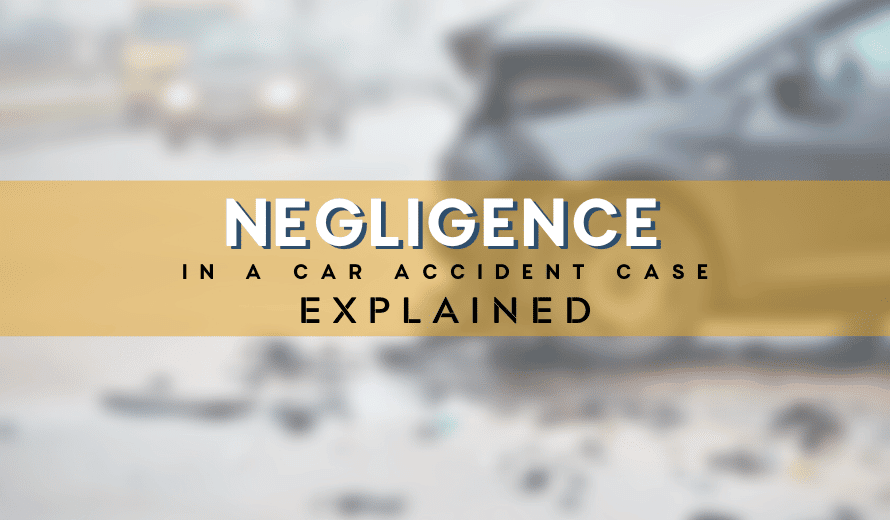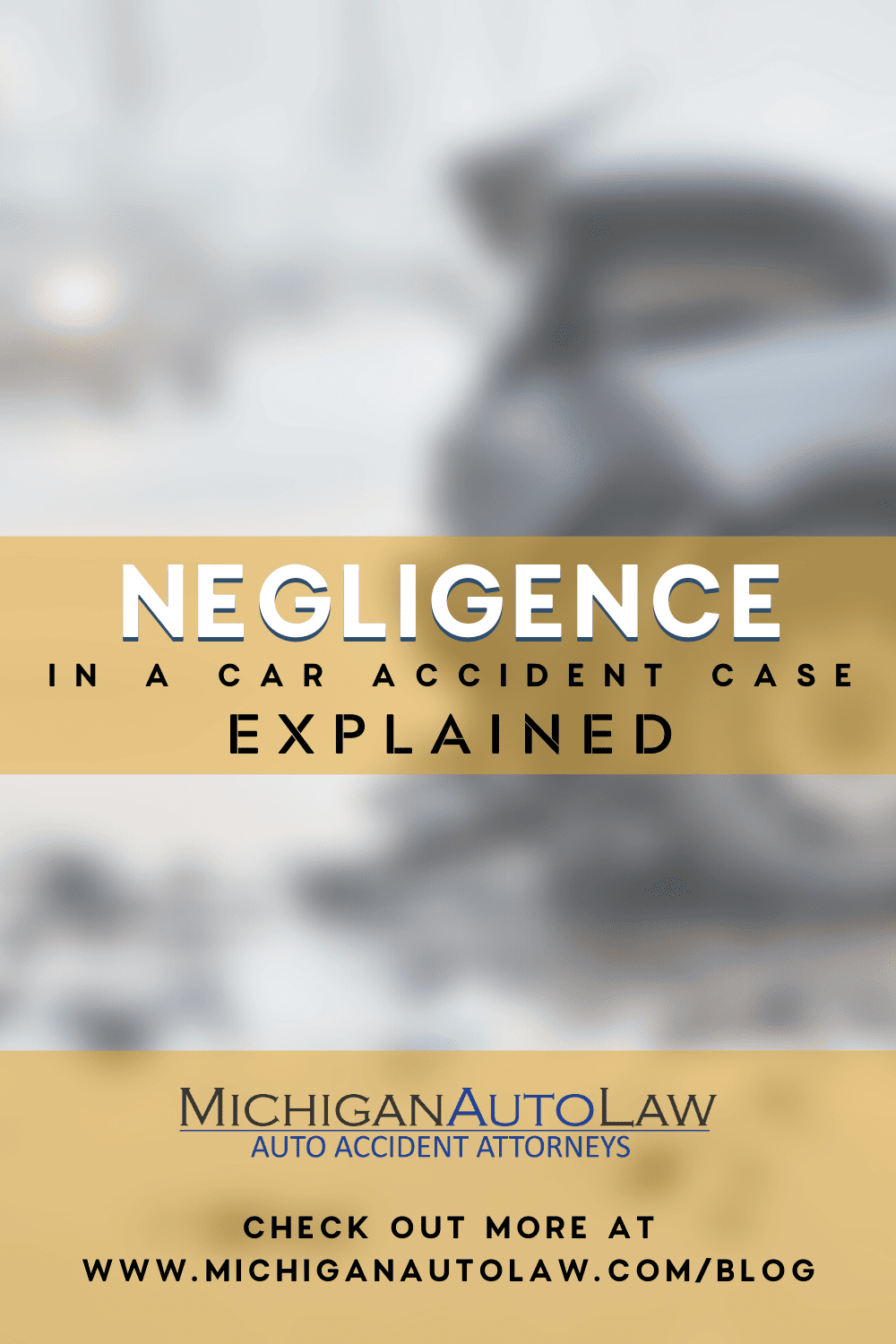Can You Sue For Negligence In A Car Accident Case?

Can you sue for negligence in a car accident case in Michigan? Proving who is negligent – or who is at fault – is the critical first step that must be taken in every successful auto lawsuit. Without determining this, there cannot be a successful lawsuit.
But that doesn’t mean there cannot be a recovery or that you will not be entitled to your auto No-Fault benefits. A lawsuit against a negligent driver is only one of the three lawsuits that injured people have after an accident in Michigan.
What is negligence in a car accident case?
In Michigan negligence in a car accident case is proving that the at-fault driver did something that a reasonably careful person would not do or that he or she failed to do something that a reasonably careful person would do.
In Michigan, in order to sue for negligence in a car accident case determining this is required for a person who has been injured in a crash to sue for noneconomic loss damages (which are most commonly known as pain and suffering compensation) and for economic losses involving excess medical expenses, lost wages and survivor’s loss benefits.
What is considered being negligent?
There are several occurrences that could be used to prove in order to sue for negligence in a car accident case in Michigan. They include:
- Failure to use ordinary care – Failure to use the ordinary care that a reasonably careful person would use for the safety of others
- Violation of state traffic laws – It can be inferred that a driver was negligent if he or she violated a state traffic law before or at the time of the accident.
- Violation of city or local traffic ordinances – A driver’s violation of city or local traffic ordinances before or at the time of an accident is evidence that should be considered in determining whether he or she was negligent.
- Violation of state regulations – A driver’s violation of state regulations before or at the time of an accident is evidence that should be considered in determining whether he or she was negligent.
- Rear-ending another vehicle – A driver “shall be deemed prima facie guilty” negligent driving if he or she “overtook and struck the rear end of another vehicle proceeding in the same direction . . .” (MCL 257.402(a))
Examples of driver negligence in a car accident case
- Texting while driving
- Talking on the phone while driving
- Being distracted while driving
- Drunk driving
- Drugged driving
- Drowsy driving
- Speeding
- Failure to yield (including but not limited to intersections and when merging)
- Running red lights
- Disregarding stop lights
- Rear-ending another (due to a failure to stop within an assured, clear distance of another vehicle (MCL 257.627(1))
- Improper lane usage
Can you sue for negligence in a car accident?
In Michigan, you can sue for negligence in a car accident case if the driver who caused the crash was fully or paritally at-fault but proving it has occurred is only the first step to having a successful lawsuit. Common types of negligence are running red lights, speeding and rear-e.
How to prove and sue for negligence in a car accident?
Below are the elements a victim needs to prove in sue for negligence in a car accident case in Michigan:
- The driver who caused the accident that resulted in the victim’s injuries was negligent
- The accident victim suffered an injury as a result of the negligent driver
- The driver’s negligent driving was a cause of this injury
- The injury is a natural and probable result of the negligent driving
- Damages resulting from an accident victim’s injuries which may be pain and suffering compensation, excess medical expenses, and/or economic loss
Importantly, in Michigan there is an additional element that is required to recover for pain and suffering from a lawsuit. Michigan is a threshold state in addition to being an auto No-Fault state. This requires an injury victim to satisfy the tort threshold for “serious impairment of body function.”
What is the tort threshold to file a lawsuit against an at-fault driver?
In Michigan, in order for a car accident victim to sue for negligence and recover pain and suffering compensation, a victim prove that he or she suffered a “serious impairment of body function.”
The No-Fault defines “serious impairment of body function” as:
“Serious impairment of body function” is “an impairment” that: (1) “is objectively manifested, meaning it is observable or perceivable from actual symptoms or conditions by someone other than the injured person”; (2) “is an impairment of an important body function, which is a body function of great value, significance, or consequence to the injured person”; and that (3) “affects the injured person’s general ability to lead his or her normal life, meaning it has had an influence on some of the person’s capacity to live in his or her normal manner of living. Although temporal considerations may be relevant, there is no temporal requirement for how long an impairment must last. This examination is inherently fact and circumstance specific to each injured person, must be conducted on an individual basis, and requires comparison of the injured person’s life before and after the incident.” (MCL 500.3135(5))
This tort threshold requirement also applies to non-Michigan residents seeking economic loss damages for an accident lawsuit . (MCL 500.3135(3)(d))
What damages can be recovered when suing for negligence in a car accident case in Michigan?
Accident victims may pursue the following types of recoveries in a lawsuit:
- Pain and suffering compensation (also known as noneconomic loss damages), which will require satisfying the tort threshold of “serious impairment of body function”
- Excess economic loss damages for wage loss, survivor’s loss benefits and medical expense benefits (for medical costs that exceed a person’s chosen No-Fault PIP medical benefits coverage level, once they become available after July 1, 2020)
- Economic loss damages sought by a non-Michigan resident, which will require satisfying the tort threshold of “serious impairment of body function”
Blaming the injured person when suing for negligence in a car accident case in Michigan
All accident injury victims seeking a pain and suffering recovery when suing for negligence in a car accident case in Michigan need to be aware that it is sometimes not enough to be completely innocent and hurt.
Victims involved in a lawsuit need to brace themselves for insurance company adjusters and defense lawyers often refusing to take full responsibility for the harms and losses that the negligent at-fault driver has caused.
This is often described in a lawsuit when the insurance company as “denies, defends, delays.” Unfortunately, as attorneys, we often see claims adjusters and defense lawyers deny that their insureds caused injuries or even “blame the victim.” In the context of proving the driver was negligent, denying they did anything wrong to cause a crash means the defense now has the legal burden to prove “comparative fault.” What they are saying, in effect, is that the person injured also is at-fault for the crash.
In Michigan, according to comparative fault laws, to have a successful lawsuit when suing for negligence requires proving the car accident victim is less than 51% at fault or they are completely barred from compensation for their pain and suffering. The law is as follows:
- If a victim is 51% or more “at fault” in causing the accident that led to his or her injuries, then he or she cannot sue for pain and suffering compensation. (MCL 500.3135(2)(b))
- If a victim is 50% or less “at fault,” then he or she can still sue for pain and suffering compensation, but his or her recovery will be reduced by “the percentage of negligence attributable” to the victim.
In practice, here’s what comparative fault means:
If there is a Michigan accident and the at-fault driver is determined to be 75% “at fault,” but the victim is determined to be 25% “at fault,” then the victim’s recovery of damages will be reduced by 25%. For example, if the jury determined that the victim was entitled to $1 million in pain and suffering compensation, then that would be reduced by 25%, leaving the victim with a recovery of $750,000.
Notably, a victim’s recovery when suing for negligence in a car accident case in Michigan can be reduced by a maximum of 5% if he or she was not wearing a seat belt at the time of the accident and if that was deemed to be negligent on the victim’s part. (MCL 257.710e(8))
Injured In A Car Accident In Michigan? Call The Attorneys at Michigan Auto Law
If you were injured in a car accident in Michigan and want to sue the at-fault driver for negligence, call now (855) 781-7747 for a free consultation with one of our experienced car accident lawyers. There is no cost or obligation. You can also visit our contact page or use the chat feature on our website.
Michigan Auto Law is Michigan’s largest and most successful law firm that specializes exclusively in helping people who have been injured in auto accidents.
Our secret? Our car accident lawyers deliberately handle fewer cases than other personal injury law firms. This allows us to focus more time and attention on our cases.
Unlike other law firms, our auto accident attorneys are never too busy to promptly return phone calls and answer questions.
We have more than 2,000 5-Star Reviews that reflect this care and attention to detail.
More importantly, this client-focused approach leads to better and faster settlements for our clients. Michigan Auto Law has recovered more million-dollar settlements and trial verdicts for motor vehicle accidents than any other lawyer or law firm in Michigan. We’ve also recovered the highest ever reported truck accident and car accident settlement in the state.
Call now so we can start making a real difference for you.






